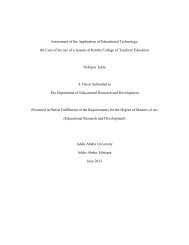FACTORS THAT CONTRIBUTE TO THE PROBLEMS EFL ...
FACTORS THAT CONTRIBUTE TO THE PROBLEMS EFL ...
FACTORS THAT CONTRIBUTE TO THE PROBLEMS EFL ...
Create successful ePaper yourself
Turn your PDF publications into a flip-book with our unique Google optimized e-Paper software.
Even though the factors identified through the interview were almost similar to<br />
those of the listening difficulties identified though the questionnaire, their details<br />
are presented under their respective categories. Let us begin with the listeners’<br />
factors.<br />
I. Listener factors<br />
This category contains the factors that are related to the listeners. The minor<br />
groups of this category include affective factors, fatigue, lack of background<br />
knowledge, poor English proficiency, and difficulties related to listening strategies.<br />
Each of them is presented as follows.<br />
1) Affective factors<br />
Some affective factors might distract learners from listening and understanding.<br />
The affective factors that play a negative role in listening comprehension include<br />
anxiety, frustration, and resistance. For example, learner (S18) felt depressed when<br />
she failed to comprehend: "I felt so depressed because I was totally lost in my<br />
personal matter outside class." Another learner (S3) related her comprehension<br />
failure to the failure of the listening strategies she applied: "The strategies I learned<br />
were not helping me enough." Likewise, learner (S15) experienced similar affective<br />
influence when a self-monitoring strategy was not functioning well: "I couldn't get<br />
the details out of the text even though I felt I had self-monitored myself . . . Feeling<br />
so depressed. It's so difficult for me to feel like giving up." The frustration led to<br />
thoughts of giving up the listening task. Some other students also reported that<br />
their frustration was related to their unfamiliarity with the speech of the native<br />
speakers. Learner (S7) reported, “I have never ever been exposed to the speech of<br />
the native speakers until I enrolled in the listening course, so I feel worried<br />
whenever I engage in listening to the recordings.” Another Learner (S16) reported,<br />
“I didn’t practice listening skills at lower levels, so the listening course here was<br />
strange for me. Frankly, when I come to the listening class, I always feel worry.”<br />
2) Lack of background knowledge<br />
Some learners experienced problems regarding to interpretation of the perceived<br />
input. Some Learners were also unable to find the appropriate meaning or<br />
interpretation of particular vocabulary items, expressions, or entire text. The<br />
reasons for this might be associated with learners' ability of contextualizing the<br />
59
















